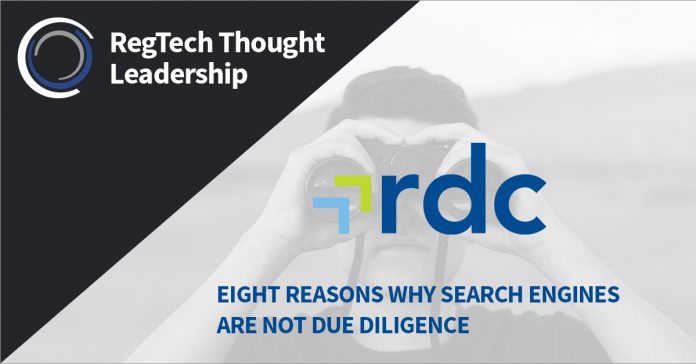Search engines are free, easy to use and powerful. Could you use them to run a KYC/AML screening program? You could – but in the end, it will expose you to significantly more cost and risk than opting for a purpose-build solution. Here are eight reasons why.
1. DATA FROM SEARCH ENGINES IS UNSTRUCTURED
Search engines return stories and URL links, when what you ideally need are consolidated profiles, with secondary identifiers such as age, location and connections organized for easy review. Sometimes, you’ll need content from multiple stories to make an onboarding decision.
2. SEARCH IS INEFFICIENT
First, you get pages and pages of results, many of which are not relevant. Second, there’s a lot of duplication, since high-priority stories are often syndicated and therefore repeated many times. This creates huge volumes of false-positives that analysts must research. Finally, search engines do not allow for daily or periodic review of adverse media, creating even more work for analyst teams. The result is tremendous inefficiency and excessive compliance costs.
3. SEARCH ENGINES ARE BIASED
Search Engine Optimization (SEO) can manipulate the results that are returned in a single search, pushing certain topics to the top of a search or others to the bottom. Search results are also influenced by users’ locations, what they have searched for previously. This means inconsistent review across different analysts and makes it much harder to identify risks efficiently.
4. IMPORTANT INTELLIGENCE IS MISSING
As publishers move content behind paywalls/subscription controls, it’s only indexed on search engines, which don’t provide the full reference or story. Content is also sometimes archived and removed from search indexes over time. All of this can result in ‘missing’, risk-relevant content that may be critical to due diligence decisions.
5. A SEARCH ENGINE’S PRIORITIES ARE NOT YOUR PRIORITIES
Search engines prioritize news based on the popularity of the story or source. This has no relevance to your rules and priorities around due diligence.
6. HOW DO YOU KNOW IT’S NOT FAKE NEWS?
Search algorithms are confidential. But they all essentially prioritize news based on clicks and indexing, not on the integrity of sources. For adverse media, this means that stories from anonymous or unknown authors or people of questionable integrity are placed alongside valid sources. Again, this makes it harder to find truly risk-relevant information.
7. YOU CAN’T AUDIT A SEARCH ENGINE
Because search results are constantly updated, the same search carried out just minutes later can return different results. This creates complications for quality control, regulatory reviews, and decision-making. There is also no way to track a profile at a point in time and store those results for future audit needs.
8. MONITORING BECOMES YOUR PROBLEM
Due diligence doesn’t end when business relationships begin. Any customer or partner could become involved in activities that conflict with your compliance policies and rules, putting your organization at risk. Organizations relying on search engines are forced to screen either once a year or take a segmentation approach, only re-screening the highest-risk individuals. Both these methods are inefficient and can leave you exposed.
So what’s the answer?
Don’t rely on search engines for due diligence. RDC’s solution, for example, overcomes all of their limitations. It is:
Structured – we aggregate, curate and index data, and stored as profiles for efficient searching and filtering
Efficient– machines do the hard work, with AI-based name matching reducing false positives by up to 90%
Unbiased – consistent filtering and prioritization algorithms eliminate subjectivity and search engine biases.
Complete – we collect data from more than 200,000 reputable sources, with a full audit trail
Prioritized – we remove “popularity bias” to focus exclusively on risk-relevance
Credible – “fake news” is eliminated using source validation, NLP technology and expert curation
Auditable – RDC’s data and screening platform delivers consistent, documented and auditable results
Monitored – your portfolio can be automatically monitored every day with no extra work for compliance staff.
Copyright © 2018 RegTech Analyst






